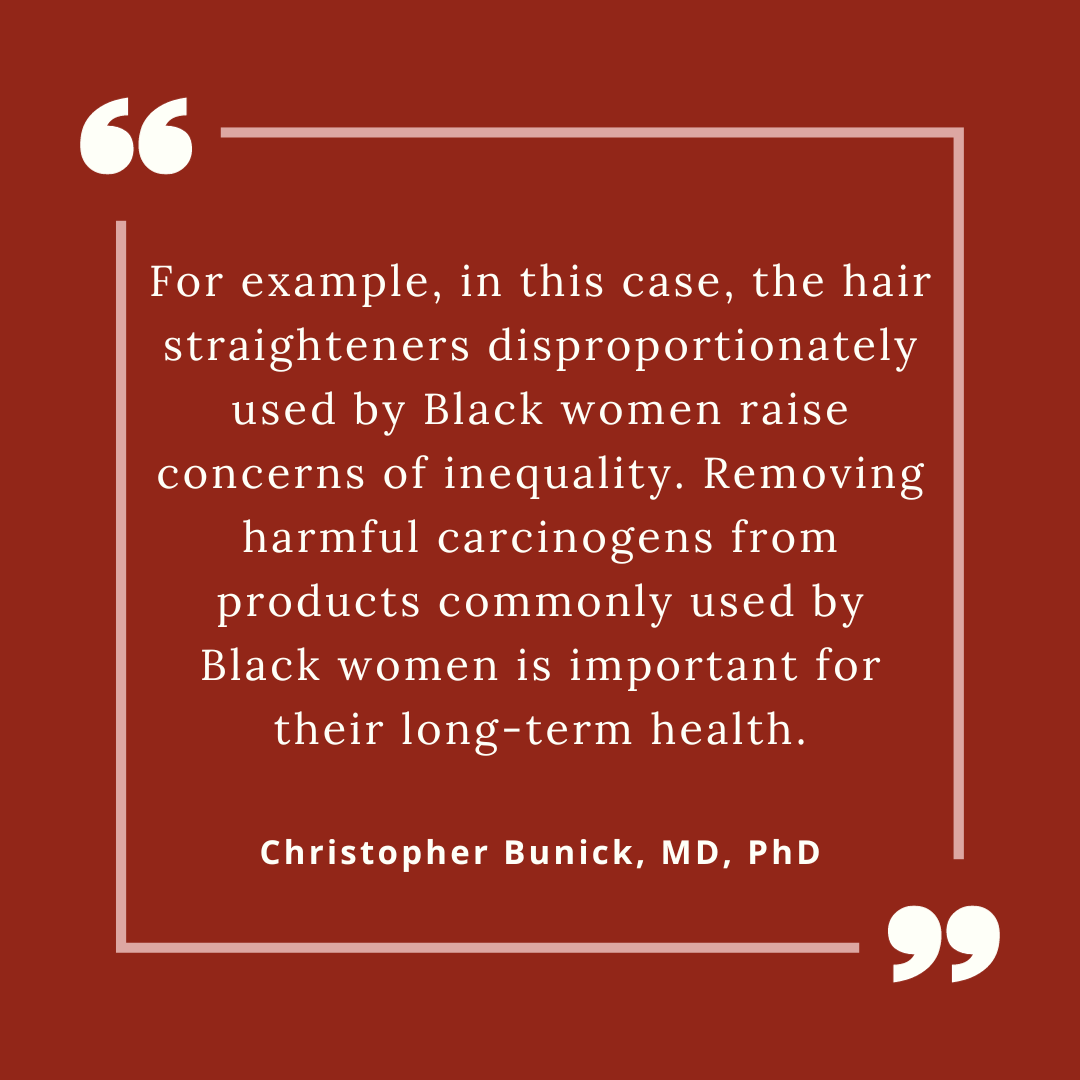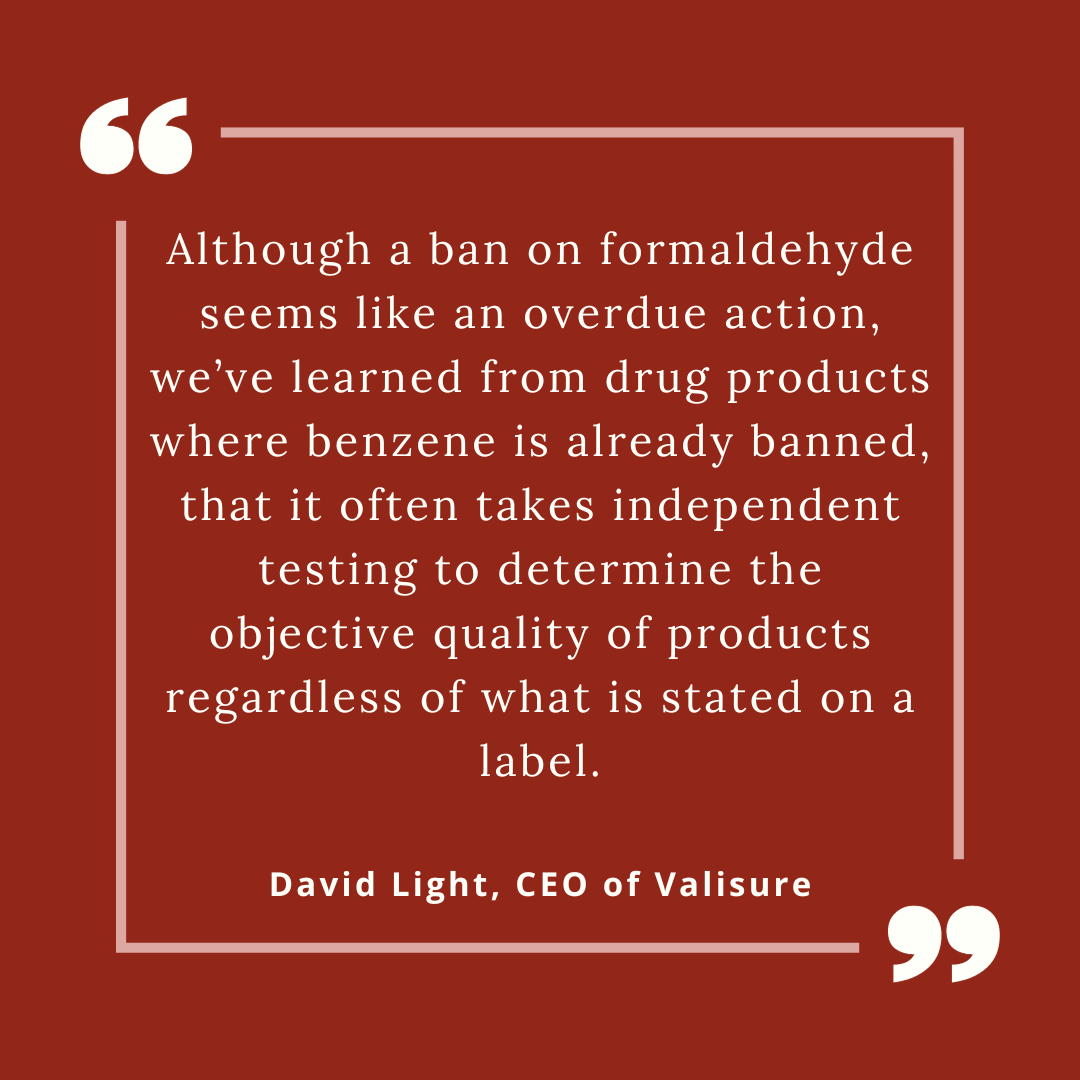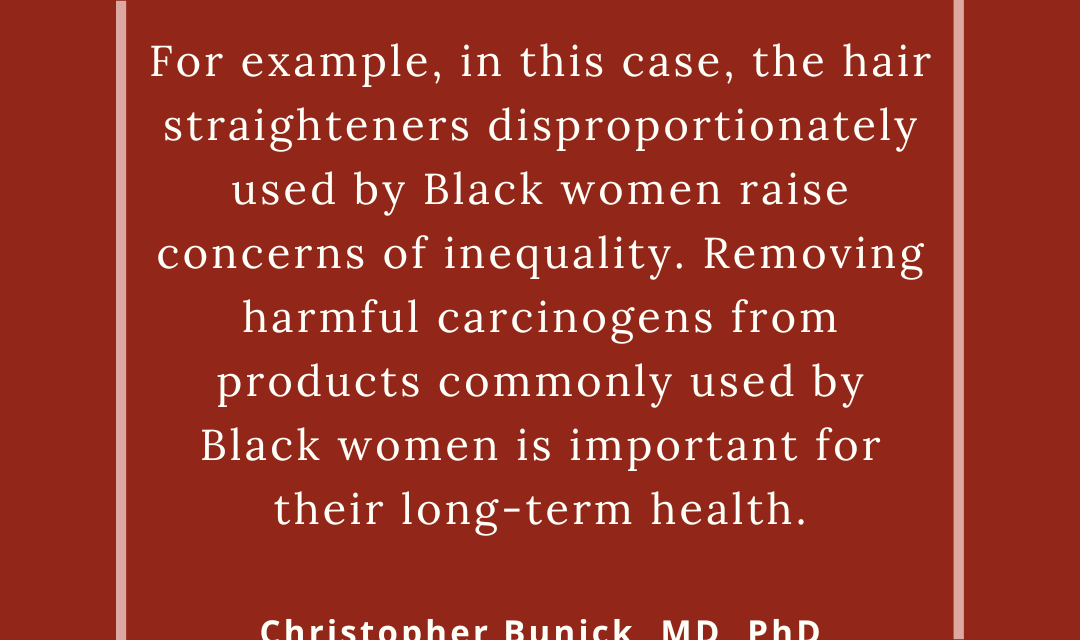Formaldehyde (FA) is one of the latest chemicals on the US FDA’s radar, as the agency is considering a ban on formaldehyde or formaldehyde-releasing chemicals found in hair smoothing or straightening products. In October, the FDA released a proposed ban, stating that “Use of hair smoothing products containing FA and FA-releasing chemicals is linked to short-term adverse health effects, such as sensitization reactions and breathing problems, and long-term adverse health effects, including an increased risk of certain cancers.” The target date for the ban is April 2024.1
“I am excited to learn that the FDA is making decisions to protect consumers from dangerous and harmful chemicals in common over the counter personal hygiene products. Here, the FDA is specifically focused on formaldehyde and other formaldehyde-releasing chemicals (e.g., methylene glycol) in hair straightening products. Why now? There’s a growing body of evidence connecting the use of formaldehyde and formaldehyde-releasing chemicals with the risk of uterine cancer and breast cancer. One study showed 2.4% higher rates of uterine cancer among women 70 or older who used hair straightening products with formaldehyde in the previous 12 months compared to no use,” said Christopher Bunick, MD, PhD, associate professor of dermatology and physician-scientist at the Yale School of Medicine in New Haven, Connecticut.
According to the FDA, when hair smoothing products are heated during a hair treatment, formaldehyde is released into the air as a gas. If a hair salon does not have proper ventilation, both the hair stylist and client are at risk of inhaling the harmful gas.2 The National Cancer Institute writes that “When formaldehyde is present in the air at levels exceeding 0.1 ppm, some individuals may experience adverse effects such as watery eyes; burning sensations in the eyes, nose, and throat; coughing; wheezing; nausea; and skin irritation.” In 1980, a study found that exposure to formaldehyde could cause nasal cancer in rats, raising concerns that formaldehyde exposure causes cancer in humans.3
“Formaldehyde is classified as a Group 1, ‘known human carcinogen’ by the International Agency for Research on Cancer, which puts it in the same classification as benzene and other well-characterized carcinogens like tobacco smoke. Being classified in ‘Group 1’ means that there is sufficient evidence not just in animal studies, but in human beings, that the chemical can increase the risk of cancer in people exposed to it over time,” said David Light, chief executive officer of Valisure, an independent laboratory that chemically tests drugs and consumer products in New Haven, Connecticut.
Formaldehyde in Hair Straightened Deemed Unsafe in 2016
Although the FDA is making strides towards banning formaldehyde in hair straightening products, previous efforts were made in 2016, but with no action. According to internal agency emails obtained under the Freedom of Information Act by the advocacy group Environmental Working Group and shared with The New York Times, FDA scientists deemed hair straighteners with formaldehyde unsafe in 2016. Despite agency lawyers drafting rules for a proposed ban, no action was ever taken.4 Now, 7 years later, the FDA is acting on these concerns.
“It is frustrating that it has taken over 7 years for the FDA to act upon formaldehyde in hair relaxers after the issue has been identified; however, it is common for regulatory action to take a long time. Therefore, it is that much more important for the industry to take it upon itself to make quality improvements, like removing formaldehyde from hair relaxers, and independent testing should be better integrated into the supply chain in order to help ensure these industry actions are properly taken and provide transparency to industry and individual purchasers,” said Light.
Increased Risk of Uterine Cancer for Black Women

One of the more concerning aspects of formaldehyde’s adverse effects is the increased risk of uterine cancer. Specifically, hair straightening products are often marketed to Black women, which are linked to increasing their risk of developing uterine cancer. Recently, Boston University’s Black Women’s Health Study found that the “long-term use of chemical hair relaxers was associated with increased risk of uterine cancer among postmenopausal women, but not among premenopausal women.” The study included 44,798 women with an intact uterus who self-identified as Black, and who were followed from 1997 to 2019.5
“Clearly, humans are diverse, and that diversity is special. Over the counter cosmetic products should be beneficial to consumers, and not harm their health. More investigation is needed on the quality control of personal care products, but also which populations are more vulnerable to certain types/groups of products. For example, in this case, the hair straighteners disproportionately used by Black women raise concerns of inequality. Removing harmful carcinogens from products commonly used by Black women is important for their long-term health,” said Bunick.
Will Benzene be the Next Proposed FDA Ban?
Benzene contamination has been a growing conversation since detectable levels of benzene were found in sunscreen and after-sun products in May 2021. The breaking news of high levels of benzene, a known carcinogen, gained considerable attention from both health care providers and consumers, and the detectable contamination did not stop with sunscreen. Additional personal care products such as antiperspirants, hand sanitizers, antifungal sprays, and dry shampoos have been added to the list of benzene-containing products since 2021. However, unlike formaldehyde, there is still no proposed FDA action regarding benzene contamination in personal care products.
“The American Cancer Society clearly lists formaldehyde as a Group 1 carcinogen. Their page provides lists of substances and exposures that are known or suspected to cause cancer. To help put these lists into context, some related information is included on how different agencies and groups test and classify possible carcinogens. This is the same grouping with another chemical called benzene, which over the past 2 years has been found in numerous health and personal care products by an independent drug quality control evaluator called Valisure: hand sanitizers, sunscreens, after-sun products, antifungal sprays, antiperspirant sprays, and dry aerosolized shampoos,” noted Bunick. “Therefore, it is not new that hair care products may contain carcinogens. For formaldehyde, there is more patient data delineating the risk increase with exposure to hair straightening products; however, I believe and hope the day will come when benzene will also receive stricter FDA regulation. In dermatology, we often see a scarring hair loss condition called central centrifugal cicatricial alopecia, which disproportionately affects Black women, and it has long been surmised chemical relaxers may be linked to disease pathogenesis in many cases. Therefore, the potential FDA ban may extend beyond reducing cancer risk, but also preventing devastating scarring hair loss.”
Valisure has been closely following the detectable levels of benzene found in personal care products, as it was the first to report the levels of benzene found in 78 different sunscreen products in 2021. Since its initial findings, Valisure has reported additional findings of benzene contamination, most recently in aerosolized dry shampoo. In November 2022, Valisure submitted a Citizen’s Petition to the FDA regarding concerning levels of benzene found in numerous dry shampoo products.

“It is disappointing that the FDA has not yet responded to our petitions on benzene contamination in multiple personal care products, like sunscreens, body sprays, and hand sanitizers. One of the most critical requests in these petitions is for the FDA to clarify if any benzene is allowed as a contaminant in standard over-the-counter drug products, and if so, what is the regulatory limit in these types of products that many consumers use daily. Benzene is effectively banned in consumer products, which means you will not likely see it on a product label. Valisure’s analysis found it in many products as an unexpected contaminant that likely comes from the manufacturing process,” said Light. “However, formaldehyde is currently allowed in cosmetic products, so you may see it on a product label. Although a ban on formaldehyde seems like an overdue action, we’ve learned from drug products where benzene is already banned, that it often takes independent testing to determine the objective quality of products regardless of what is stated on a label. Indeed, according to NPR, investigators with the New York State Department of Health discovered that formaldehyde was actually present in products labeled as ‘formaldehyde-free’ when they independently tested them. We at Valisure applaud the proposed ban of the known human carcinogen, formaldehyde, in hair relaxer products, but caution that to help ensure that such a ban is effective, independent testing of on-market products will be critical.”
Bunick has also closely followed benzene contamination by educating colleagues at many dermatologic meetings across the US, as well as collaborating with Valisure to promote further action. Both Bunick and Light look forward to the hopeful right steps toward the FDA regulating formaldehyde and benzene found in personal care products.
“Unlike in the case of benzene contamination, formaldehyde and methylene glycol should be listed on the product ingredient label. Consumers can check labels and avoid products with formaldehyde or formaldehyde-releasing chemicals. However, formaldehyde and methylene glycol have synonyms, and product labels may differ between manufacturers making quick identification of problem ingredients on the label difficult. For example, formaldehyde may be listed as formalin or formaldehyde monohydrate, or methylene glycol listed as methanal or methanediol. From a legislative viewpoint, this is a major achievement to secure tighter FDA regulation of a carcinogen in over the counter products. I sincerely hope lawmakers in Congress continue to fight for improved quality control in the manufacturing of over the counter personal care products. The stories of formaldehyde and benzene show there is much work to be done to provide better quality and safer products for everyone,” concluded Bunick.
References
- Use of formaldehyde and formaldehyde-releasing chemicals as an ingredient in hair smoothing products or hair straightening products. Department of Health and Human Servies. October 16, 2023. Accessed November 6, 2023. https://www.reginfo.gov/public/do/eAgendaViewRule?pubId=202304&RIN=0910-AI83
- Hair smoothing products that release formaldehyde when heated. US Food and Drug Administration. Updated February 25, 2022. Accessed November 6, 2023. https://www.fda.gov/cosmetics/cosmetic-products/hair-smoothing-products-release-formaldehyde-when-heated
- Formaldehyde and cancer risk. National Cancer Institue. Updated June 10, 2011. Accessed November 6, 2023.https://www.cancer.gov/about-cancer/causes-prevention/risk/substances/formaldehyde/formaldehyde-fact-sheet
- Rabin R. The FDA wanted to ban some hair straighteners: it never happened. The New York Times. https://www.nytimes.com/2020/10/21/health/brazilian-blowout-formaldehyde-fda.html#:~:text=In%202016%2C%20agency%20scientists%20deemed,according%20to%20newly%20obtained%20emails.&text=It’s%20been%20more%20than%20a,hair%20after%20a%20single%20application.
- Bertrand KA, Delp L, Coogan PF, et al. Hair relaxer use and risk of uterine cancer in the Black Women’s Health Study. Environ Res. 2023;239(Pt 1):117228. doi:10.1016/j.envres.2023.117228




